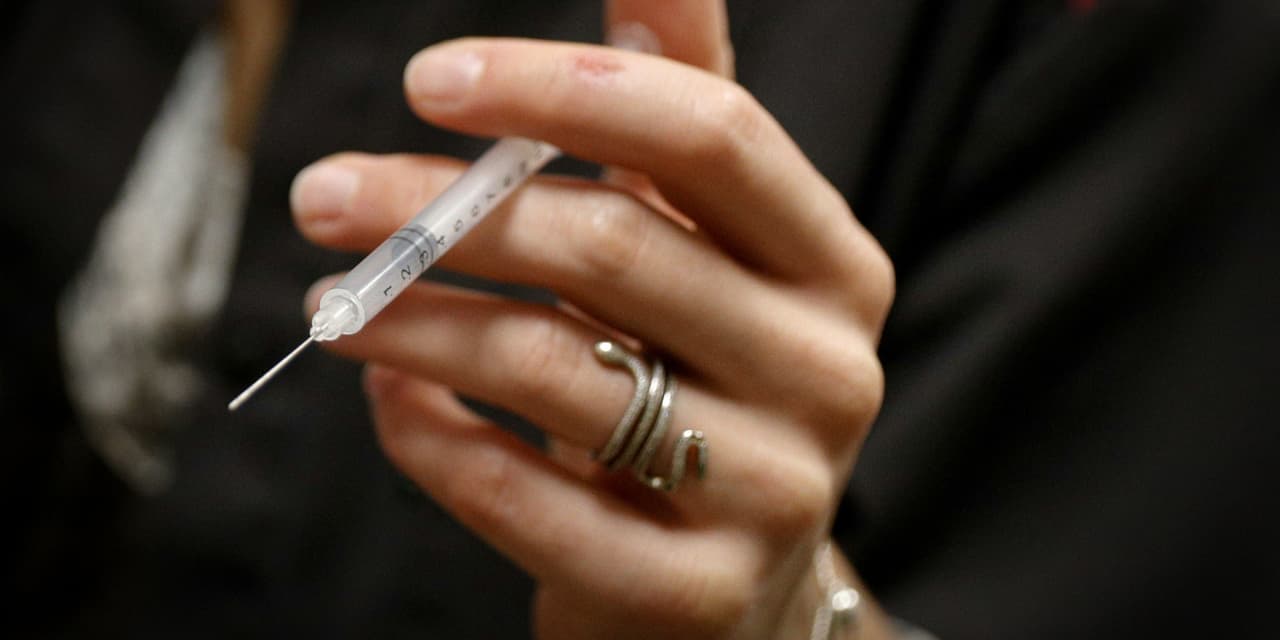Pfizer
‘s third-quarter financial report fell slightly short of Wall Street expectations on Tuesday morning, just weeks after the company drastically reduced its forecast for sales of its Covid-19 products
Pfizer
(ticker: PFE) reported an adjusted diluted loss of 17 cents per share in the third quarter, on revenue of $13.2 billion. Analysts surveyed by FactSet were expecting Pfizer to report a loss of 8 cents a share on revenue of $13.3 billion.
Pfizer said its diluted loss per share was “significantly impacted” by a $5.6 billion non-cash inventory write-off, much of it for unused doses of its Covid-19 antiviral Paxlovid.
The company also said its planned $43 billion acquisition of the cancer-focused biotech
Seagen
(SGEN) was “continuing to progress well,” and that it expects the deal to close late this year or early next.
Pfizer shares were down 0.2% on Tuesday. The company’s report comes after a grim week of earnings for its pharma peers, in which shares of a long list of drugmakers fell significantly after they issued their quarterly earnings reports.
Speaking with Barron’s on Tuesday afternoon, Pfizer CEO Albert Bourla said that the uncertanties around the company’s Covid-19 business had been cleared away, and that the non-Covid business was strong. “I think the prospects are very good,” he said. “I think pretty soon I expect investors will see that.”
Pfizer revenue was down 42% compared to the same quarter last year, but the company said that sales of its non-Covid products were up 10% on an operational basis. CFO David Denton said in a statement that the company remained “squarely on track” to hit its full-year non-Covid operational growth revenue target of between 6% and 8%.
“We are encouraged by the strong performance of Pfizer’s non-Covid products in the third quarter of 2023, including significant contributions from new launches and robust year-over-year growth for several key in-line brands,” CEO Albert Bourla said in the earnings release.
Sales of Comirnaty, the company’s Covid-19 vaccine, were $1.3 billion for the quarter, slightly below the $1.5 billion FactSet analyst consensus estimate. Sales of Paxlovid were $202 million. Pfizer said in mid-October that the U.S. government had returned roughly a third of the Paxlovid doses it had bought from the company, and cut its 2023 guidance for Paxlovid sales to $1 billion, from $8 billion.
Bourla told Barron’s that he expects Covid-19 vaccine rates to remain stable between 2023 and 2024 at 17% of the U.S. population. “Those that they are going to get the vaccine now are people that truly believe in the value of vaccination,” he said. “That will be the base.”
Pfizer said that sales of its new respiratory syncytial virus vaccine, Abrysvo, were $375 million for the third quarter. Sales of Nurtec ODT/Vydura, which the company acquired late last year, were $233 million for the quarter.
Pfizer also reaffirmed its fiscal 2023 earnings and revenue guidance provided earlier this month.
The company also reported new data on Tuesday on a new messenger RNA-based influenza vaccine, which it tested in a Phase 3 trial in adults aged 18 to 64. The company said that the results showed that mRNA-based vaccine was superior to a standard, approved influenza vaccine, and that safety was “similar.”
Last week, the company reported positive data in a trial of an mRNA-based vaccine that protects against both flu and Covid-19.
“In general, the flu mRNA was very well tolerated,” Pfizer chief scientific officer Mikael Dolsten told Barron’s on Tuesday. “I think it won’t be any harder for people to get one shot instead of two.”
Pfizer shares were down roughly 40% this year before the earnings announcement, hitting a new 52-week low on Friday. Management is seeking to interest investors in what have been an extraordinarily busy few months of product launches, including Abrysvo, its ulcerative colitis pill, and a meningococcal vaccine, among others.
But investors have still been focused on the company’s plummeting Covid-19 revenue.
In mid-October, Pfizer acknowledged that its initial projections for 2023 Covid-19 sales were too optimistic, while announcing a major cost-cutting program. Also in mid October, Pfizer cut its forecast for its full-year profit, saying it now expects adjusted diluted 2023 earnings of between $1.45 and $1.65 a share. That implies a loss in the second half because adjusted diluted earnings were $1.90 for the first half of the year.
Pfizer on Tuesday mantained that mid-October guidance. “Our product portfolio remains strong,” Denton said, according to prepared remarks for an investor call Tuesday morning. “We expect that the cost realignment program will improve our operating margins, enhancing long-term shareholder value.”
Denton told Barron’s that the company’s cost-cutting programs were “up and running.”
“We have a team around it,” he said. “We’ve got line of sight to a billion dollars this year and another two and a half next year, and we’re working hard against it.”
Pfizer stock is down nearly 10% since the new forecasts emerged, though it rose 1.2% on Oct. 16, the trading day after the announcement.
The company offered no updates on a Phase 2b trial of Pfizer’s oral obesity pill danuglipron, which could compete with
Eli Lilly’s
(LLY) experimental obesity pill orfoglipron. Positive data could allow Pfizer to play in the GLP-1 space, which Lilly and
Novo Nordisk
(NVO) have so far dominated. While some analysts had anticipated new danuglipron data on Tuesday, none was forthcoming.
“All the market research indicates that a very big part of the population, they don’t want injections, they want pills,” Bourla told Barron’s. He said that the data currently is “not ready.”
Write to Josh Nathan-Kazis at josh.nathan-kazis@barrons.com
Read the full article here













Leave a Reply